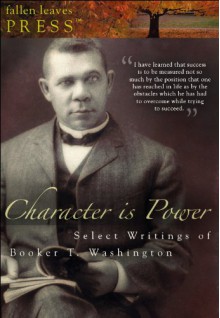Character is Power: Select Writings of Booker T. Washington (Three books in one volume!)
NOTE: This edition has a linked "Table of Contents" and has been beautifully formatted (searchable and interlinked) to work on your Amazon e-book reader, Amazon Desktop Reader, your iPad/iPhone ebook reader and any other device that carries the Amazon app. This collection of books written by...
show more
NOTE: This edition has a linked "Table of Contents" and has been beautifully formatted (searchable and interlinked) to work on your Amazon e-book reader, Amazon Desktop Reader, your iPad/iPhone ebook reader and any other device that carries the Amazon app. This collection of books written by Booker T. Washington includes: "Up from Slavery – An Autobiography", "My Larger Education", and "Future of the American Negro."Booker Taliaferro Washington (April 5, 1856 – November 14, 1915) was an American educator, race leader, author, orator, and political leader. He founded the Tuskegee Normal and Industrial Institute in Alabama. He was one of the most influential (and controversial) African Americans in history. He was born into slavery to a slave mother and white father, who was a nearby planter, in a rural area in southwestern Virginia. After emancipation, Washington worked in West Virginia in a variety of manual labor jobs before making his way to Hampton Roads seeking an education--he was self-motivated and committed to his own education from a young age. He worked his way through Hampton Normal and Agricultural Institute (now Hampton University) and attended college at Wayland Seminary (now Virginia Union University). After returning to Hampton as a teacher, in 1881 he was named as the first leader of the new Tuskegee Institute in Alabama. Washington attained national prominence for his Atlanta Address of 1895, which attracted the attention of politicians and the public, making him a popular spokesperson for African-American citizens. He built a nationwide network of supporters in many black communities, with black ministers, educators and businessmen composing his core supporters. Washington played a dominant role in black politics, winning wide support in the black community and among more liberal whites (especially rich Northern whites). He gained access to top national leaders in politics, philanthropy and education. Washington's efforts included cooperating with white people and enlisting the support of wealthy philanthropists, helping to raise funds to establish and operate thousands of small community schools and institutions of higher education for the betterment of blacks throughout the South. This work continued for many years after his death. Northern critics called Washington's followers the "Tuskegee Machine." After 1909, Washington was criticized by the leaders of the new NAACP, especially W. E. B. Du Bois, who demanded a stronger tone of protest for advancement of civil rights needs. Washington replied that confrontation would lead to disaster for the outnumbered blacks, and that cooperation with supportive whites was the only way to overcome pervasive racism in the long run. At the same time, he secretly funded litigation for civil rights cases, such as challenges to southern constitutions and laws that disenfranchised blacks.In this collection:Book One: Up from Slavery – An Autobiography (published in 1901) - a poignant memoir from Washington's early days of slavery on a plantation and his emancipation at the age of nine. Washington would go on to be the single-most powerful influence to disenchanted young blacks Nationwide. He was a powerful presence and self-made man, leading the way for future leader Martin Luther King Jr.Book Two: My Larger Education (published in 1911) - a detailed account of the creation, development, and promotion of the Tuskegee Institute to satisfy frequent public requests for information about "the educational methods which we are now using at Tuskegee; and to illustrate, for the benefit of the members of my own race, some of the ways in which a people who are struggling upward may turn disadvantages into opportunities". In doing so, he also reveals complex, nuanced views about how to best promote the advancement of African Americans after Emancipation.Book Three: Future of the American Negro (published in 1899) - It should also be borne in mind, in our efforts to chang
show less

